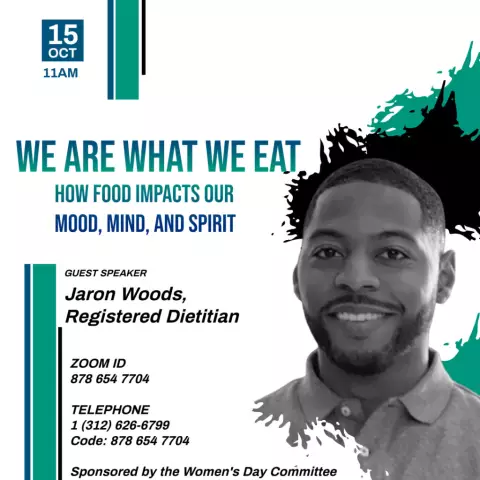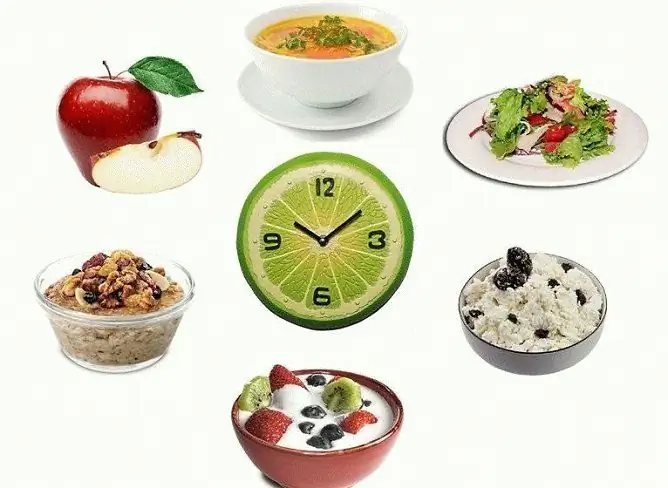- Author Rachel Wainwright wainwright@abchealthonline.com.
- Public 2023-12-15 07:39.
- Last modified 2025-11-02 20:14.
Human nutrition
Continuous exchange of substances between the human body and the environment is the basis of life processes. Our body consumes oxygen, food and water from the environment.
Human nutrition is the main biological need of the body for the renewal and construction of tissues, their growth, development and normal functioning. Regular intake of food ensures the continuity of metabolic processes, normal health and performance.

The nature of human nutrition and the composition of food gradually changed. This is due to changes in geographic and climatic conditions, the development of production, the expansion of agricultural activities and other factors. The modern food ration of the population is formed depending on national characteristics, customs, traditions and the level of cultural and economic development of the state.
Human food:
- Animal origin - meat of various animals and birds, fish, eggs, milk and dairy products;
- Vegetable origin - vegetables, mushrooms, fruits, berries, cereals and legumes.
For normal life, it is necessary to have a combination of foods in the diet that provide the body with a sufficient amount of proteins, carbohydrates, fats, vitamins, and trace elements. Improper nutrition in a person's life can reduce the body's defenses and provoke the development of a number of diseases, and ultimately lead to death.
Obesity as a result of poor human nutrition
The global problem of our time is obesity as a result of excessive human nutrition, combined with a decrease in physical activity.
According to the World Health Organization (WHO), obesity, due to its widespread occurrence (especially in countries with a highly developed level of civilization), is an epidemic that threatens the mass health of mankind. The population of the Earth is 7 billion people, of which, according to WHO, almost 400 million are overweight, which is about 6% of the total. But in highly developed countries this figure is much higher, for example, in the USA it reaches 75%.
Obesity significantly increases the risk of developing:
- Type 2 diabetes mellitus;
- Arterial hypertension;
- Atherosclerosis;
- Ischemic heart disease;
- Disorders in the work of the musculoskeletal system;
- Psychological disorders.
Consider the relationship between diabetes and obesity. Disruption of insulin at the level of peripheral fat and muscle tissue occurs due to obesity and type 2 diabetes in equal measure. The presence of excess weight with insulin resistance of type 2 diabetes mellitus of a hereditary nature can provoke the manifestation of the disease and complicate its course in the future.
As a result of scientific research, it has been proven that with a decrease of only 1 kg in body weight in obesity and type 2 diabetes, life expectancy increases by an average of 3-4 months and the risk of developing diabetes decreases by 3-5%.
To avoid the problems caused by obesity and to keep the weight normal, a person's diet should be rational, i.e. physiologically complete, taking into account age, gender, nature of physical activity and health status. Taking into account the global nature and relevance of the issues of rational human nutrition, many theories and methods for solving this problem have been developed.
Ecological food
Ecological human nutrition consists in the use of biologically pure products grown in natural conditions, without the use of:
- Chemicals that accelerate the growth of plants and animals;
- Synthetic pesticides to protect plantations from natural pests;
- Artificial food additives for feeding animals;
- Genetically modified foods (GMOs).
Special quality standards have been established for bioproducts, the finished samples of which are tested for 250-400 points, from the absence of heavy metals and pesticides in products to determining the taste and appearance.
More than 80% of harmful substances entering the body, a person receives from food, this is from 3 to 9 kg per year of nitrates, preservatives, pesticides, food colors, flavorings, carcinogens. The consequence of such a load on the diet can be the development of cancer, diseases of the heart and circulatory system, the accumulation of excess weight and much more.
Organic products, the basis of ecological human nutrition, contain 50-60% more antioxidants than products of traditional cultivation technology. The content of vitamins and minerals in them is 10-15% higher. At the same time, such products practically do not contain carcinogens and various harmful chemicals.
Ecological human nutrition allows you to preserve and strengthen health, increase immunity and improve the quality of life in general.
Healing food Shatalova

A well-known neurosurgeon, a famous long-liver, who lived to 96 years old, keeping an active lifestyle, Galina Shatalova, for a long time, mainly from her personal experience, developed a method of healing species nutrition.
The basis of the diet according to the method of healing nutrition of Shatalova is made up of vegetables, fruits, cereals and nuts. Meat, fish, dairy products, tonic drinks, if not specific, should be excluded from the human diet. With regard to the diet, Shatalova's nutritional method is similar to strict vegetarianism or a macrobiotic nutrition system. An essential distinguishing feature is the minimum consumption of food. Galina Shatalova was confident, and from her own experience she proved that the amount of food required for active life is actually 10 times less than that consumed by an ordinary person now. According to her calculations, the real daily requirement for nutrients is 10 g of protein, 5 g of fat and 150 g of carbohydrates. According to the Institute of Nutrition, a person needs 100 g of protein, 80 g of fat and 450 g of carbohydrates.
Shatalova's healing nutrition method is designed to minimize the load that a person receives when eating. It was in this load that Shatalova saw the basis of all the problems of the human body, including psychological ones. The main rule of Shatalova's technique is with qualitatively simple and light food, its minimum amount.
The method is controversial, it has many both supporters and opponents. But it is difficult not to take into account the fact that at the age of 90, Shatalova demonstrated amazing stretching and flexibility of the body, sitting on the twine and standing on the bridge, doused herself with ice water every day and engaged in therapeutic fasting, while remaining socially active.
The importance of nutrition in human life can hardly be overestimated. The state of the body directly depends on the choice of food in the daily diet. All products have a certain pharmacological activity, and the state of health, mood, energy availability, and, ultimately, the quality of life depend on the correctness of their choice.
Found a mistake in the text? Select it and press Ctrl + Enter.






